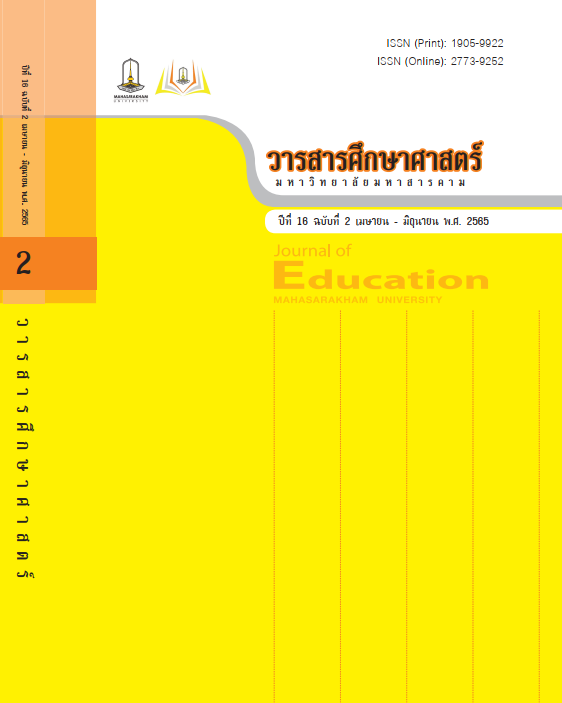Factors Affecting the Mathematical Problem-Solving Ability of Kalasin University’s Students
Main Article Content
Abstract
The purposes of this research were: 1) to study the relationship between factors affecting the mathematical problem-solving ability, and 2) to create the regression equations of the factors affecting the mathematical problem-solving ability. The samples were 121 students of Kalasin University studying in the 2021 academic year received from simple random sampling. The research instruments were test of mathematical problem-solving ability, and survey of factors affecting the mathematical problem-solving ability. The statistics used for analyzing data consisted of multiple correlation analysis, and multiple regression analysis. The results indicated that: 1) The 6 factors had the significant relationship with the mathematical problem-solving ability at the level of.01 and 2) The factors of background knowledge X1, attitude towards mathematics learning X2, intention to learning X3, and self-ability X6 could be predicted the mathematical problem-problem of 72.1 percent. The results could also be used to create the regression equations in terms of raw scores and standard scores as follow:
Raw scores Regression Equation. Ŷ = -7.903+2.557X1 +2.560X2 +2.112X3 +3.214X6
Standard Score Regression Equation. Ẑ = 0.335Z1 +2.864Z2 +2.6432Z3 +3.698Z6
Downloads
Article Details

This work is licensed under a Creative Commons Attribution-NonCommercial-NoDerivatives 4.0 International License.
References
จุฑามาศ กันทา และบัณฑิตา อินสมบัติ. (2557). ปัจจัยที่ส่งผลต่อความสามารถในการโจทย์ปัญหาคณิตศาสตร์ของนักเรียนชั้นประถมศึกษาปีที่ 6 จังหวัดพิจิตร ; Causal Factors Affect the Ability of Solving Mathematical Problem of Prathomsuksa 6 Students of Phichit Province. Journal of Graduate Studies in Northern Rajabhat Universities, 4(6), 41-56.
เฉลิมสิน สิงห์สนอง. (2559). การศึกษาปัจจัยด้านจิตพิสัยที่มีอิทธิพลต่อความสามารถในการแก้โจทย์ปัญหาคณิตศาสตร์ในรายวิชาคณิตศาสตร์และสถิติในชีวิตประจำวัน สำหรับนักศึกษาชั้นปีที่ 1 มหาวิทยาลัยธุรกิจบัณฑิตย์. รายงานผลการวิจัย, มหาวิทยาลัยธุรกิจบัณฑิตย์, กรุงเทพมหานคร.
พจนีย์ มา สุข. (2564). ปัจจัยที่ส่งผลต่อผลสัมฤทธิ์ทางการเรียนคณิตศาสตร์ของนักเรียนชั้นมัธยมศึกษาตอน ต้น โรงเรียนสาธิตพิบูลบำเพ็ญ มหาวิทยาลัยบูรพา. ศึกษาศาสตร์สาร มหาวิทยาลัยเชียงใหม่, 5(3), 11-25.
วชิรภรณ์ เทียบเพชร. (2562). ปัจจัยที่มีอิทธิพลและแนวทางการส่งเสริมการรู้เรื่องคณิตศาสตร์ในศตวรรษที่ 21 ของนักเรียนชั้น มัธยมศึกษาปีที่ 3 สังกัดสำานักงานเขตพื้นที่การศึกษามัธยมศึกษา เขต 26. วิทยานิพนธ์ กศ.ม. มหาวิทยาลัยมหาสารคาม, มหาสารคาม.
สุภมาศ ถานโอภาส. (2555). ปัจจัยเชิงสาเหตุที่มีอิทธิพลต่อผลสัมฤทธิ์ทางการเรียนกลุ่มสาระการเรียนรู้ คณิตศาสตร์ของนักเรียนชั้นประถมศึกษาปีที่ 5 จังหวัดศรีสะเกษ. วิทยานิพนธ์ กศ.ม. มหาวิทยาลัยมหาสารคาม, มหาสารคาม.
สำารวย หาญห้าว (2560). ปัจจัยที่มีผลต่อเจตคติและความสามารถในการแก้ปัญหาทางคณิตศาสตร์ของนักเรียนชั้นมัธยมศึกษาปีที่ 1 โรงเรียนสาธิตมหาวิทยาลัยรามคำาแหง. วารสารวิชาการศึกษาศาสตร์, คณะศึกษาศาสตร์ มหาวิทยาลัยศรีนครินทรวิโรฒ, 18(1), 142-158.
Bloom, B.S. (1976). Haman Characteristics and School Learning. McGraw- Hill Book Company: New York.
Charles, Randal, & Lester, Frank k. (1982). Teaching problem solving: What, why & how. California: Dale Seymour.
Diaz and Hernando H. (2009). Verbal language as a mathematical tool. Education y educadores, 12(3), 13-31
Halton, Boyd. (1964, January). Motivation and General Mathematics Students. Mathematic Teachers, 57, 20-25.
Pajares, F., & Kranzler, J. (1995). Role of Self-Efficacy and General Mental Ability in Mathematical Problem-Solving: A Path Analysis.
McClelland, D.C. (1961). Human motivation. New York: Cambridge University.
Mehrens, William A. and Lehman, Irvin J. (1975). Measurement and evaluation in education and psychology. (2nd ed). New York: Holt Rinehart and Winston, Inc.


